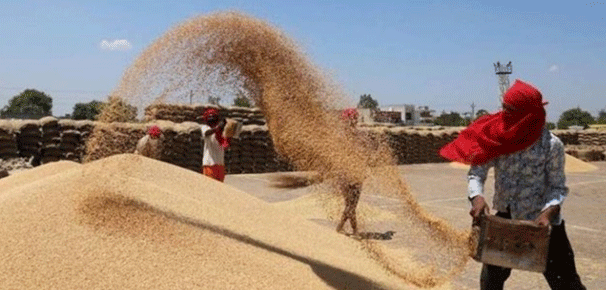The Indian government has implemented stringent measures to regulate wheat stocks held by traders, wholesalers, and retailers in an effort to secure food supply and mitigate unethical practices such as hoarding and speculative trading. The Ministry of Consumer Affairs, Food and Public Distribution announced on Monday that these stock limits will be in place until March 31, 2025.
In a statement, the Ministry emphasized the need for these restrictions to manage the overall food security of the nation. “To ensure the comprehensive management of food security and to prevent unethical hoarding and speculation, the Government of India has decided to impose stock limits on wheat applicable to traders/wholesalers, retailers, large chain retailers, and processors across all states and union territories,” the statement read.
The new regulations, outlined in the “Removal of Licensing Requirements, Stock Limits, and Movement Restrictions on Specified Foodstuffs (Amendment), 2024,” took effect immediately on June 24, 2024, and will remain in force until March 31, 2025. These measures are designed to stabilize the wheat market and prevent price volatility driven by artificial shortages.
According to the Ministry’s guidelines, the stock limits are defined as follows:
- Traders and wholesalers are restricted to a maximum of 3,000 metric tons (MT) of wheat.
- Retailers are limited to 10 MT per retail outlet.
- Large chain retailers are also restricted to 10 MT per outlet and a total of 3,000 MT across all their depots.
- Processors are allowed to hold up to 70% of their monthly installed capacity (MIC) multiplied by the remaining months of the fiscal year 2024-25.
This policy intervention comes in response to fluctuations in wheat availability and prices, influenced by both domestic and international factors. Recent data indicate a notable increase in wheat prices due to several factors, including erratic weather patterns and global supply chain disruptions.
In addition to stabilizing the market, the government aims to ensure fair distribution and availability of wheat across the country, especially in states and regions prone to food insecurity. By imposing these stock limits, the government seeks to dissuade large-scale entities from creating artificial shortages that could drive up prices and disrupt the market equilibrium.
The imposition of wheat stock limits by the Indian government is a crucial step towards ensuring national food security and preventing market manipulation. While these measures may pose challenges for traders and retailers, they are essential for maintaining a stable and fair food supply system. Effective monitoring and enforcement of these limits will be key to their success.
Error




